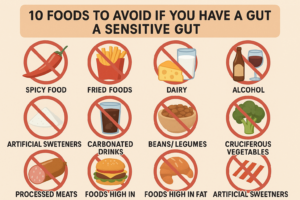
Living with a sensitive gut can be challenging. Stomach cramps, bloating, gas, or unpredictable trips to the bathroom can make everyday life stressful. But one of the easiest ways to manage a sensitive digestive system is by paying close attention to what you eat. Certain foods can irritate your stomach, trigger discomfort, or make symptoms worse.
If you often struggle with gut issues, this guide will help you understand 10 foods to avoid so you can keep your digestive system happy and healthy.
1. Spicy Foods
Spicy foods like hot peppers, chilies, and spicy curries might taste delicious, but they can wreak havoc on a sensitive gut. The heat-producing compound in peppers, called capsaicin, can irritate the lining of your stomach and intestines, causing cramps and burning sensations. If you love spice, start with milder options and avoid eating too much at once.
2. Fried and Greasy Foods
Fried foods—think samosas, pakoras, french fries, or fried chicken—are difficult for your stomach to break down. They stay longer in the digestive tract, which can lead to bloating, gas, and discomfort. Instead, try baking or grilling foods to reduce fat content while keeping meals tasty.
3. Dairy Products
Many people with a sensitive gut are also lactose intolerant, meaning they struggle to digest the sugar found in milk, cheese, and other dairy products. This can lead to bloating, stomach pain, or diarrhea. Switch to lactose-free options, plant-based milks, or limit dairy to see if your symptoms improve.
4. Artificial Sweeteners
Products labeled as “sugar-free” often contain artificial sweeteners like sorbitol, xylitol, or mannitol. While they may seem like a healthier choice, these sweeteners can be hard on your digestive system. They’re poorly absorbed and often lead to bloating, cramping, or diarrhea. Stick to natural sweeteners like honey or small amounts of raw sugar instead.
5. Processed Meats
Bacon, sausages, deli meats, and hot dogs contain additives, preservatives, and high amounts of salt. These can irritate your gut and make digestive problems worse. Plus, processed meats often have high fat content, which is harder to digest and can cause bloating.
6. Carbonated Drinks
Fizzy sodas, sparkling water, and beer may seem harmless, but the bubbles can fill your stomach with gas and lead to bloating and burping. If you have a sensitive gut, it’s best to avoid carbonated drinks altogether and opt for flat water or herbal tea instead.
7. Beans and Legumes
Beans, lentils, and chickpeas are healthy and full of fiber, but they can also cause trouble for people with sensitive stomachs. They contain certain sugars that are hard to digest and lead to gas and bloating. If you love beans, try soaking them overnight and cooking them well to make them easier on your gut.
8. Raw Vegetables
While raw veggies like broccoli, cabbage, and cauliflower are nutritious, they can be tough on your digestive system. These cruciferous vegetables contain fiber that can ferment in the gut, causing gas and bloating. Lightly steaming or roasting vegetables makes them easier to digest and gentler on your stomach.
9. High-Fat Foods
Creamy sauces, heavy desserts, and rich pastries contain large amounts of fat, which slow down digestion. This can make you feel heavy, bloated, or nauseous, especially if you already have a sensitive stomach. Choose lighter, balanced meals instead.
10. Caffeinated Drinks
Coffee, strong tea, and energy drinks stimulate the digestive tract, which can lead to diarrhea or stomach upset in some people. If you notice that caffeine makes your gut symptoms worse, try cutting back slowly and switch to non-caffeinated herbal teas or warm water.
Tips to Manage a Sensitive Gut
Avoiding these trigger foods is a great start, but here are a few extra tips to keep your gut happy:
✅ Eat small meals more often instead of big meals.
✅ Drink plenty of water throughout the day.
✅ Keep a food diary to track which foods cause trouble.
✅ Manage stress, as anxiety can affect digestion.
✅ Get advice from digestive health professionals when needed.
When to See a Specialist
If you’ve tried avoiding these foods but still experience persistent digestive issues, it’s important to seek professional help. Chronic bloating, frequent diarrhea, constipation, or severe stomach pain should never be ignored. Talking with a trusted doctor or one of the top 10 gastroenterologist in Surat can help you get the right diagnosis and create a treatment plan that works for you.
Final Thoughts
Managing a sensitive gut takes time, patience, and a bit of experimenting with your diet. By avoiding foods that irritate your digestive system and replacing them with gut-friendly alternatives, you can improve your comfort and quality of life.
Remember, you don’t have to tackle this journey alone. Listen to your body, stay informed, and don’t hesitate to get expert help when you need it. Here’s to a happier, healthier gut and a more comfortable life ahead!
